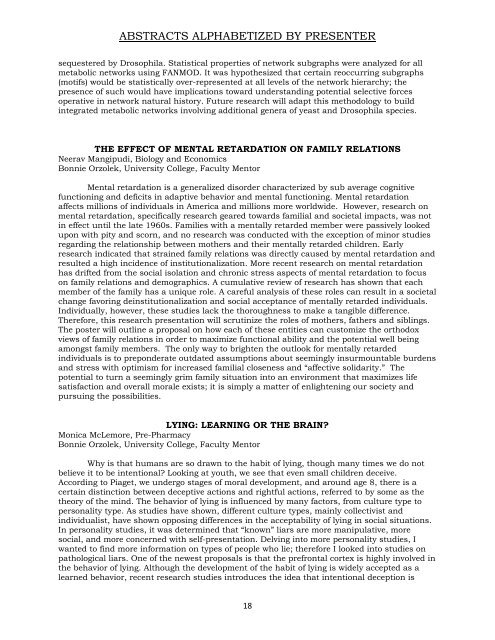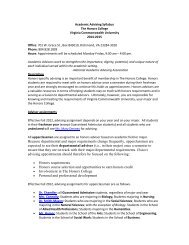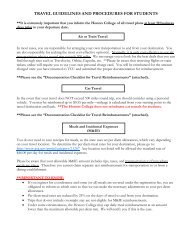here - VCU Honors College - Virginia Commonwealth University
here - VCU Honors College - Virginia Commonwealth University
here - VCU Honors College - Virginia Commonwealth University
Create successful ePaper yourself
Turn your PDF publications into a flip-book with our unique Google optimized e-Paper software.
ABSTRACTS ALPHABETIZED BY PRESENTER<br />
sequestered by Drosophila. Statistical properties of network subgraphs were analyzed for all<br />
metabolic networks using FANMOD. It was hypothesized that certain reoccurring subgraphs<br />
(motifs) would be statistically over-represented at all levels of the network hierarchy; the<br />
presence of such would have implications toward understanding potential selective forces<br />
operative in network natural history. Future research will adapt this methodology to build<br />
integrated metabolic networks involving additional genera of yeast and Drosophila species.<br />
THE EFFECT OF MENTAL RETARDATION ON FAMILY RELATIONS<br />
Neerav Mangipudi, Biology and Economics<br />
Bonnie Orzolek, <strong>University</strong> <strong>College</strong>, Faculty Mentor<br />
Mental retardation is a generalized disorder characterized by sub average cognitive<br />
functioning and deficits in adaptive behavior and mental functioning. Mental retardation<br />
affects millions of individuals in America and millions more worldwide. However, research on<br />
mental retardation, specifically research geared towards familial and societal impacts, was not<br />
in effect until the late 1960s. Families with a mentally retarded member were passively looked<br />
upon with pity and scorn, and no research was conducted with the exception of minor studies<br />
regarding the relationship between mothers and their mentally retarded children. Early<br />
research indicated that strained family relations was directly caused by mental retardation and<br />
resulted a high incidence of institutionalization. More recent research on mental retardation<br />
has drifted from the social isolation and chronic stress aspects of mental retardation to focus<br />
on family relations and demographics. A cumulative review of research has shown that each<br />
member of the family has a unique role. A careful analysis of these roles can result in a societal<br />
change favoring deinstitutionalization and social acceptance of mentally retarded individuals.<br />
Individually, however, these studies lack the thoroughness to make a tangible difference.<br />
T<strong>here</strong>fore, this research presentation will scrutinize the roles of mothers, fathers and siblings.<br />
The poster will outline a proposal on how each of these entities can customize the orthodox<br />
views of family relations in order to maximize functional ability and the potential well being<br />
amongst family members. The only way to brighten the outlook for mentally retarded<br />
individuals is to preponderate outdated assumptions about seemingly insurmountable burdens<br />
and stress with optimism for increased familial closeness and “affective solidarity.” The<br />
potential to turn a seemingly grim family situation into an environment that maximizes life<br />
satisfaction and overall morale exists; it is simply a matter of enlightening our society and<br />
pursuing the possibilities.<br />
LYING: LEARNING OR THE BRAIN?<br />
Monica McLemore, Pre-Pharmacy<br />
Bonnie Orzolek, <strong>University</strong> <strong>College</strong>, Faculty Mentor<br />
Why is that humans are so drawn to the habit of lying, though many times we do not<br />
believe it to be intentional? Looking at youth, we see that even small children deceive.<br />
According to Piaget, we undergo stages of moral development, and around age 8, t<strong>here</strong> is a<br />
certain distinction between deceptive actions and rightful actions, referred to by some as the<br />
theory of the mind. The behavior of lying is influenced by many factors, from culture type to<br />
personality type. As studies have shown, different culture types, mainly collectivist and<br />
individualist, have shown opposing differences in the acceptability of lying in social situations.<br />
In personality studies, it was determined that “known” liars are more manipulative, more<br />
social, and more concerned with self-presentation. Delving into more personality studies, I<br />
wanted to find more information on types of people who lie; t<strong>here</strong>fore I looked into studies on<br />
pathological liars. One of the newest proposals is that the prefrontal cortex is highly involved in<br />
the behavior of lying. Although the development of the habit of lying is widely accepted as a<br />
learned behavior, recent research studies introduces the idea that intentional deception is<br />
18








